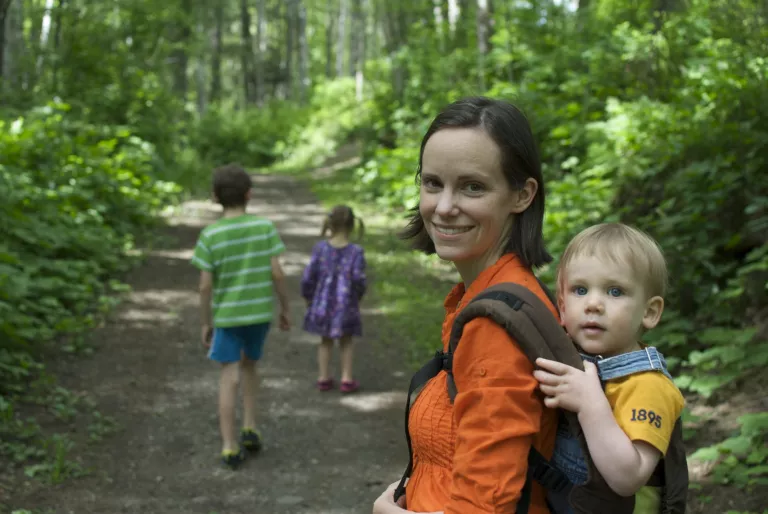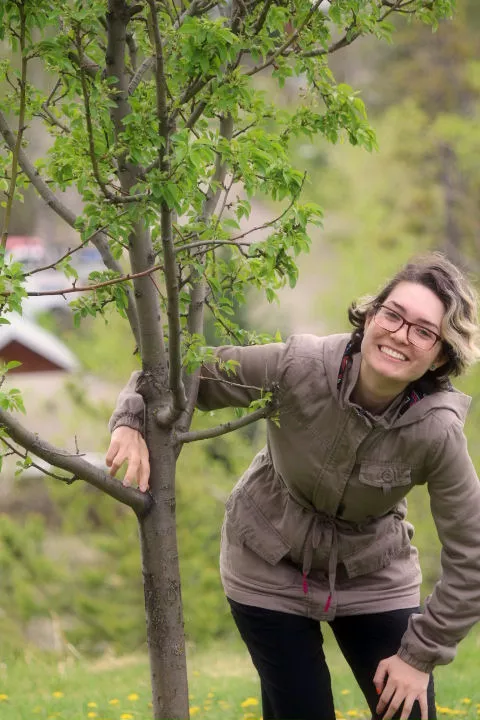Canada's Green Alumni - An interview with Nicole Botten
by Gala Munoz-Carrier
Nicole Botten is a shining example of someone who saw an opportunity for an eco-business and took advantage of the centrality of her Prince George location. Mother, small business owner and UNBC alumna, Nicole took her passion for sustainability and funnelled it into her home-based natural baby and family company The Green Sheep. As a card-carrying Northerner, Nicole has seen UNBC help change the cultural landscape of the city she has called home since birth.
Since her graduation from UNBC in 2002, Nicole has allowed her enthusiasm for waste reduction to take her across BC and even as far as Nova Scotia. Nicole worked for an environmental consulting company that focused on minimizing waste in the municipality of Smithers. Likewise, her time with BC Parks and Parks Canada had her at ecological reserves, provincial parks and recreation areas all over the province. In Nova Scotia, Nicole worked with a group classifying illegal garbage dumping. Upon her return to Prince George, she worked at the Regional District with the aim of helping to implement proper recycling for the city. In a volunteering capacity, Nicole has been involved over the years with REAPS (the Recycling and Environmental Action Planning Society) and to this day helps out with Northern Bear Awareness.
The decision to enroll at UNBC for post-secondary education was easy for Nicole, as a lifelong resident of Prince George. She appreciated the opportunity to attend university in her hometown near family. UNBC’s strength in Geography also matched her interests. As for the importance of having UNBC in the north, Nicole notes there is “a lot of pride involved” as the city has embraced the university and the diversity it facilitates. Growing up in Prince George and returning to it as the place to call her permanent home has allowed her to see the "culture of the community blossom” since the university has opened.

During her studies at UNBC, Nicole learned about how our biophysical systems work and "the impacts we have on them and ourselves". This knowledge formed the basis for the sourcing of renewable materials for her eco-company. Her belief that "by definition it is ridiculous to use unsustainable materials" resulted in the use of materials "that can be produced time after time." Nicole incorporates materials such as rubber, wool, wood, hemp, organic cotton and some alterative plastics (made from rice husks or bamboo waste) in her products. Many conventional materials are fabricated from non-renewable resources. Likewise, when it comes to disposing our waste, it does not simply “go away”. For these reasons, among others, Nicole felt it necessary to create a business that is mindful of the complete life cycle of a product. Nicole considers sustainability as central to running a business, if not just for the purpose of being environmentally responsible, but also for the financial benefits.
In much the same way that PG PIRG plays a huge role in sustainability on campus today, the organization was key in providing Nicole with the opportunity to get involved in environmental initiatives during her studies. She did everything from composting to organizing and distributing the organic produce bins (now called the Good Food Boxes). Nicole appreciated the feeling of freedom and the ability to take initiative at the university without feeling like she was stepping out of bounds. When asked about what the university can do to further its mission as Canada’s Green University, Nicole stressed the importance of being proactive in setting up the infrastructure for environmentally friendly initiatives. She believes that “things don’t happen unless there are people pushing and taking action to implement them” and the university is well equipped to do just that.
As a mother of three kids, Nicole sees the importance of teaching kids environmentally sustainable values at all ages: "it's good to have kids excited about it." She believes that if children grow up understanding the extent of the impact of their decisions, then sustainability “becomes a part of daily life” and a part of the normal decision making process. Even if sustainability is not a value for some people before parenthood, Nicole still sees the promise of the greater awareness that can come with having children.
We wish Nicole luck with The Green Sheep and we hope Nicole thinks of us at the university when she’s an eco-preneur superstar.
About the Author

As a life long resident of Prince George, I love the accessibility of both the urban and the natural that this city has to offer. I am 4/5ths of the way through my joint degree in Environmental Studies and English and I hope to be an Environmental Journalist at the end of my studies.
- Gala Munoz-Carrier